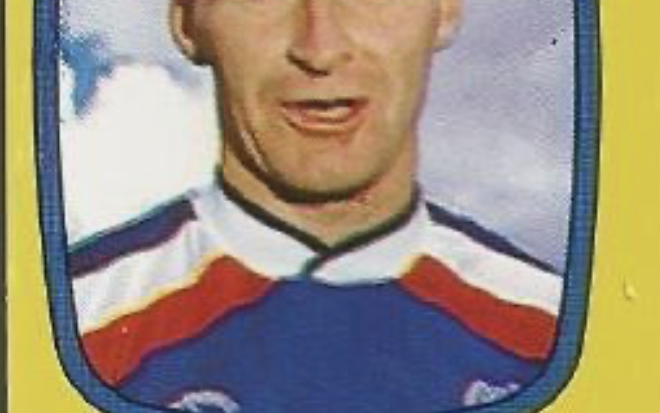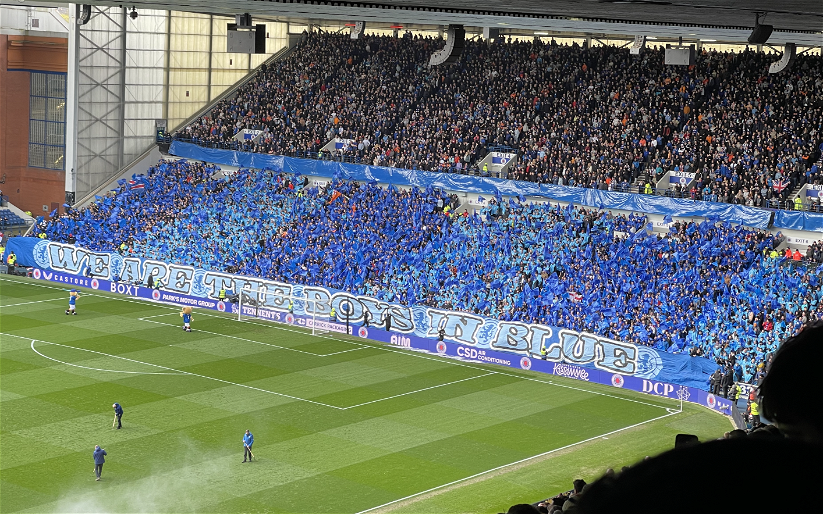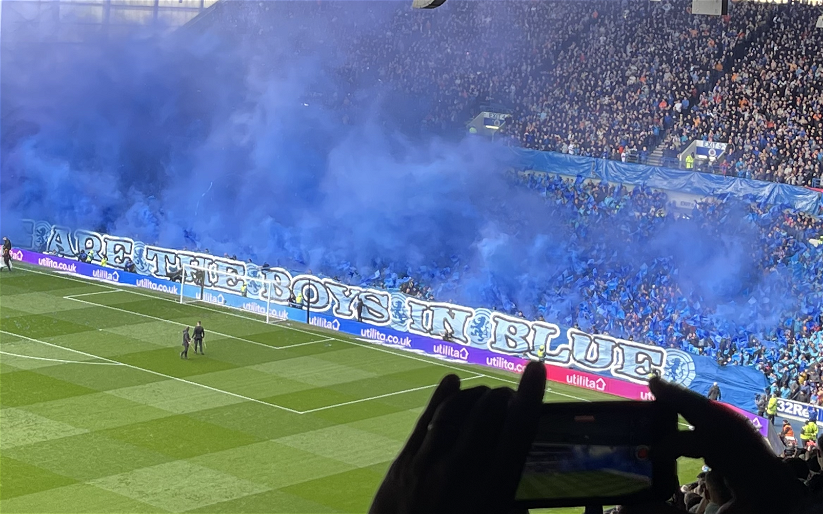By Alistair Aird
There have been several instances throughout our history where we have signed players from other Scottish clubs on the strength of their performances against us. Among the more prominent are Jim Baxter (Raith Rovers), Davie Cooper (Clydebank), and Allan Johnston (Hearts), the latter scoring a hat trick at Ibrox in 1996 before signing for Rangers three years later. In addition, there’s another chap who netted three times against us before he donned a royal blue jersey. His name is John Brown, and Bomber and his Dens Park treble are the features of this Blast from The Past article.
John Brown was born in Lennoxtown on 26 January 1962. He was brought up in Blantyre and played for St Mirren Boys’ Club. But although the Saints, Rangers, Newcastle United and Carlisle United kept an eye on him, Brown elected to sign for Hamilton Academical in 1979.
He made his league debut for Accies against Clyde at Douglas Park on 28 November 1979, and made a further 19 appearances in season 1979/80. One of them was against Keith in the Scottish Cup, the Highland League side springing a surprise by winning 3-2.
Brown was a left-back at that time, and he was in that role on the opening day of season 1980/81 when Hamilton welcomed Berwick Rangers to Douglas Park. Only 1,471 spectators were there, but they witnessed a John Brown hat trick as Accies trounced their opponents 9-1.
A month later, Brown found himself sharing a pitch with George Best, with the former Manchester United maverick in the Hibernian XI that drew 1-1 with Hamilton at Douglas Park. And that season also saw Brown come up against a future team mate, one Alistair Murdoch McCoist, who was shooting to prominence with St Johnstone.
Brown would make 148 appearances for Hamilton, scoring 11 goals, and his consistent displays attracted interest from top flight clubs. Brown was keen on a move to Rangers, but when no offer was forthcoming, he ended up signing for Dundee May 1984. The transfer fee was a paltry £40,000, and over the next four years, the redoubtable Brown became a firm favourite with the Dens Park faithful.
Brown donned dark blue for the first time on 17 July 1984 in a friendly match against Borussia Dortmund and grabbed his first goal the following day in a 5-1 win over SV Gottingen. These matches were part of a tour of West Germany and Switzerland that was undertaken to help Archie Knox prepare his side for season ahead.
Brown’s league debut came in the second league match of the season – a 1-0 defeat at Easter Road – and before August had ended, John had added another goal to his tally, a strike from 25 yards that proved to be vital. It was the equaliser in a 1-1 draw against Kilmarnock in the second round of the Skol League Cup, Knox’s side eventually edging through on penalty kicks.
Struggling to see off Kilmarnock summed up Dundee’s start to the season. They lost each of their opening four league games – included in that run was a 2-0 defeat against Rangers at Dens Park – but it was thanks to Brown that that winless run ended against Dundee United at Tannadice. With 15 minutes to go and the sides tied at 3-3, Brown rose to meet a corner kick and his header earned the visitors the two points.
Later in the season, Brown scored another vital goal for Dundee. Arriving at Ibrox in February for a fourth round Scottish Cup tie, Dundee eliminated Rangers from the tournament for the second successive season, with Brown’s goal after only nine minutes making the difference. It would be the first of a few he netted against his boyhood heroes.
Brown was now making a name for himself as a tenacious tackler who like to break forward from midfield and have a shot at goal. Indeed, his goal at Ibrox was one of three he scored in the month of February – the others were against Hearts and St Johnstone – and he popped in the only goal of the game when Celtic were beaten at Parkhead in May. That was his second goal of the season against David Hay’s side, as he had netted equaliser at Dens Park in March in the last eight of the Scottish Cup.
But it would be season 1985/86 when Brown started to appear prominently on the Rangers radar. Brown was in the side that ended Rangers’ unbeaten start to the season with a 1-0 win at Ibrox in September – he was replaced by Colin Hendry during the match – and when the sides collided again towards the end of November, Brown brutally bruised and battered a beleaguered Rangers side.
Since that match at Ibrox, Jock Wallace had watched his side win only twice in eight league games. Of the other six, four had been lost, including a 3-0 defeat a week earlier at Tynecastle. The former Rangers striker, Sandy Clark, netted two of the three Hearts goals.
Despite that run of poor form, Rangers arrived in Dundee in third place, four points behind leaders Aberdeen. Dundee were four points behind Rangers in eighth spot. They were looking to end a run of three straight league defeats having lost to Hibernian (1-2), Aberdeen (1-4), and Dundee United (0-3).
Brown had been on the bench for the Tayside derby but was restored to the starting XI for the Rangers game. For Rangers, Jock Wallace dropped misfiring Bobby Williamson for the squad – he had last scored a league goal in September – and brought in the enigmatic Ted McMinn. Bobby Russell, part of the four-man midfield against Hearts, was related to the bench and young Robert Fleck was handed the number 11 shirt.
The opening quarter of an hour of the game was cagey, but it burst to life when Tosh McKinlay was high and reckless when attempting to challenge McMinn. Referee George Smith deemed his conduct worthy of a red card, and suddenly the Rangers cause looked to have been given a boost.
But Dundee dropped the first of three Bomber bombs just 11 minutes after McKinlay’s dismissal.
A minute shy of the half-hour mark, Brown embarked on one of his trademark surges from the middle of the park and coolly despatched the ball past Nicky Walker. Ally McCoist, reborn after plummeting to the nadir of his Rangers career in that Scottish Cup tie in which Brown scored the winner, equalised 60 seconds later, but the game seesawed back in Dundee’s favour in the 33rd minute when Brown scored again.
Referee Smith awarded Dundee a free kick after a clash between Ray Stephen and David Mackinnon 25 yards from the Rangers goal, and Brown stepped up to thunder a splendid shot beyond Walker. And Bomber duly completed his hat trick after 63 minutes. Another foray into the box drew a foul from Dougie Bell, and Brown dusted himself down before clinically despatching the penalty kick.
McCoist reduced the arrears with his second goal of the game two minutes later, but Wallace’s side couldn’t muster an equalising goal.
Brown scored against Rangers again later in the season – another penalty in a 2-1 win at Dens Park in March – and those goals and some feisty jousts with the Rangers player-manager, Graeme Souness, in the two seasons that followed earned Brown his dream move to Ibrox.
The transfer fee of £350,000 would prove to be of the bargain variety. Brown made 312 appearances for Rangers and became one of the stalwarts of the nine-in-a-row era, playing an active part in eight of the nine championship-winning seasons. He also won three Scottish Cups and three League Cups.
Brown was a resolute, redoubtable, and very versatile player, steeped in the traditions of Rangers Football Club. He could play at left back or in midfield, but perhaps his finest displays in a Rangers jersey came in season 1992/93 when he played at centre-back alongside Richard Gough. Brown missed only five of the 64 competitive matches played as Rangers won the domestic Treble and came within a goal of making the first-ever Champions League Final.
There are, however, three moments that seem to stand out from his time as a Rangers player.
The first came during a UEFA Cup tie against GKS Katowice at Ibrox on 7 September 1988. During a fraught first half, Krzysztof Walczak was receiving treatment near the touchline. Brown was perturbed about the amount of time being taken and elected to pick up the physiotherapist’s medical bag and throw it off the pitch. The bag was open at the time, resulting in its contents being strewn everywhere. Brown was booked for his intervention. Mark Walters scored the only goal of the game, and a 4-2 win in Poland saw Rangers progress.
Brown was loved by the fans. They knew he was ‘one of their own’ and could align with his will to win and never-say-die attitude. And those qualities were summed up on the final day of season 1990/91.
Rangers faced Aberdeen at Ibrox needing a win to secure the Premier Division title. But Walter Smith was short of options. Richard Gough was ruled out with Hepatitis, Trevor Steven hadn’t played in the league since March, and Ian Durrant and Ally McCoist were only fit for a place on the bench. Young Tom Cowan was listed at left back, while Brown was alongside Scott Nisbet at the heart of the defence.
But Brown was struggling too. He had been troubled by an Achillies problem and had to take a pain-killing injection to play in the game. Bomber knew his Achillies could snap at any point, but there was no way he was missing such an important fixture. And he helped resolutely resist early attacking threats from Aberdeen before Mark Hateley rose majestically to meet a Mark Walters cross to give Rangers the lead.
A second from Hateley early in the second half sealed the deal, and shortly afterwards, Brown’s Achillies snapped. He was helped off the field but wasn’t about to miss out on the post-match celebrations. Complete with crutches, he was present and correct when stand-in captain, Nigel Spackman, received the league trophy, and he hobbled round the pitch as his exultant teammates took the acclaim of the Rangers supporters.
Although he had developed a habit of scoring vital goals for Dundee, Brown wasn’t especially prolific at Rangers. He managed 22 goals in his 312 appearances, but there is one that comes to mind more than any other when the Rangers supporters reflect on Bomber’s Rangers career.
On 1 January 1992, Rangers faced Celtic at Parkhead. Ally McCoist slid in to give the visitors the lead before half time, but Tony Mowbray headed Celtic level after the restart. Hateley edged Rangers ahead again – coolly converting a penalty after McCoist was then felled in the box by Gordon Marshall – but Walter Smith’s side were clinging on to that slender advantage in the closing stages.
Andy Goram had been at his brilliant best to keep Celtic at bay – one save from a rasping drive from Paul McStay was magnificent – and Rangers desperately needed a third goal to secure the points.
Enter John Brown.
Brown had come on for Stuart McCall and found himself midway inside the Celtic half when he received a pass from Nigel Spackman. He took a few strides forward towards the edge of the penalty area before unleashing a left foot shot that kissed the post before entering the net. Cue bedlam in the Rangers end, and Brown was nearly in amongst them after he hurdled the advertising hoardings behind the goal.
John Brown’s last competitive appearance for Rangers was the 1996 Scottish Cup Final against Hearts. He made three appearances in friendlies ahead of the historic season 1996/97, but injuries had finally caught up with him. Brown underwent a couple of heel operations during the season, but never regained sufficient fitness to make his way back into the first XI. He announced his retirement and moved into a coaching role with the Rangers youth and reserve teams, helping to nurture talented players like Allan McGregor, Alan Hutton, and Charlie Adam.
Bomber took on his first managerial role with Clyde in 2008 and did some scouting work for Rangers when Ally McCoist became the manager. And Brown would elevate his hero status with the Rangers supporters soon after that when the club lurched towards financial oblivion.
Stepping down from his scouting role, he stood shoulder to shoulder with his fellow supporters in the fight against Charles Green. Part of a consortium that was trying to wrestle control of his beloved club from the grubby Green, Brown fought hard to ensure Rangers lived to fight another day. His efforts would eventually be rewarded when the journey from the depths of despair was concluded when Steven Gerrard led Rangers to 55 in season 2020/21.
Inducted into both the Rangers and Dundee Hall of Fame, John Brown is an icon for both clubs. He made 135 competitive appearances for Dundee and scored 39 goals. He also served the club as manager too. His achievements on and off the pitch for Rangers have been documented in this article.
Legend? There aren’t many Dundee or Rangers supporters that wouldn’t concur with that status.




